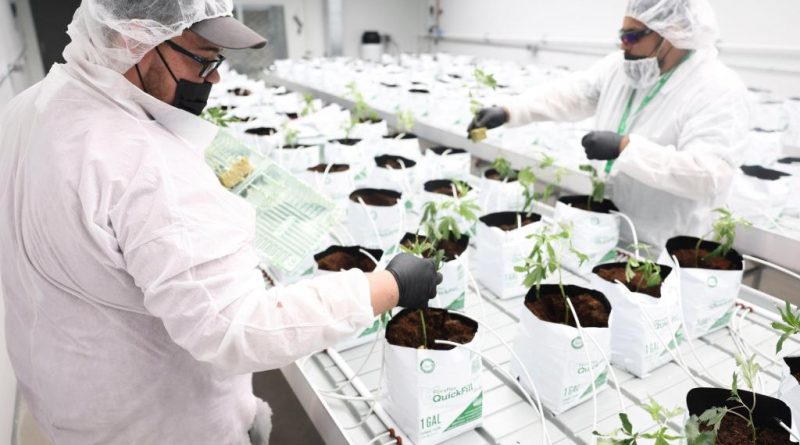Cannabis stocks rise on call to lower marijuana risk category
By Carmen Reinicke and Riley Griffin
Marijuana stocks surged on Wednesday after the Drug Enforcement Agency said it would review its classification of cannabis following a letter from the US Department of Health and Human Services that urged it to loosen rules on the substance.
The MJ PurePlay 100 Index, which tracks cannabis stocks, jumped 13%, the most since October, on the news. Goodness Growth Holdings and Columbia Care Inc. were among the biggest gainers in the index, up 26% and 39%, respectively. Tilray Brands Inc. ended the day 11% higher, while Canopy Growth Corp. rose 13%. Verano Holdings Corp. gained 17% and Cresco Labs Inc. advanced 22%.
Assistant Secretary for Health Rachel Levine recommended to the Drug Enforcement Agency that cannabis be classified as a Schedule III drug under the Controlled Substances Act, according to a letter viewed by Bloomberg News. A DEA spokesperson confirmed the department had received the letter and the agency will initiate its own review.
A Schedule III designation would put cannabis in the same category as anabolic steroids, testosterone and ketamine. It’s currently a Schedule I drug alongside heroin and LSD.
“While this is not the full legalization and access to the banking system that investors have been hoping for, it’s a piece of good news for an investor base that’s been craving some,” said Steve Sosnick, chief strategist for Interactive Brokers.
A Schedule III rating would remove some burden from US operators, Stifel analyst W. Andrew Carter wrote in a note.
“While this does not change the difficult category dynamics, we believe this is a positive for WM Technology, Hydrofarm, and GrowGeneration with customers likely to enjoy this windfall,” he said.
Two Colorado cannabis groups applaud the recent development, but argue that it doesn’t go far enough.
Colorado Leads, an alliance of cannabis business leaders, calls the recommendation by HHS “a historic step toward federal cannabis policy reform,” said Chuck Smith, president of the board of directors, in a Wednesday statement.
The organization acknowledges that rescheduling would aid the industry by alleviating “the unfair federal tax burden and lack of access to banking and financial services that cannabis businesses have shouldered for years.” And hurdles to cannabis research would also be lifted, Smith said.
Both Colorado Leads and the Colorado-based Marijuana Industry Group back descheduling cannabis entirely from the Controlled Substances Act.
Truman Bradley, executive director of the latter organization, argued that cannabis would still be considered illegal by the federal government, meaning “consumers and patients can still be criminally punished.”
In addition, “this could potentially now open the door for Big Pharma and other major corporations to take over the industry,” he said in a Wednesday statement.
Still, the move to reschedule would ease taxes on the businesses, which currently face a 75% federal tax rate compared to other small businesses, Bradley said. “This is of course in addition to state and local taxes,” he added.
After a burst of optimism following the election of Joe Biden as president in 2020, pot stocks have been mired in a slump amid delays to changes in cannabis’s status as an illegal drug.
In October, Biden rolled out initiatives focused on marijuana, including a pardon of all prior federal offenses of simple possession, while urging governors to do the same with state offenses. As a part of the effort, he asked the HHS secretary and the US Attorney General to initiate the administrative process to review how marijuana is scheduled under federal law.
Earlier this year, legislation was reintroduced in Congress that would open up banking services to the legal cannabis industry after failing to reach a vote in 2022. That lifted pot stocks and stoked hopes that the bill, called the SAFE Banking Act, could pass this year. There’s been little momentum, however, keeping banking as an overhang weighing on the industry.
Though the industry is prone to volatile swings as bullish investors cheer any progress toward legalization at the national level in the US, stocks are far from the lofty levels seen in 2018.
“When you consider what was baked into these prices at one point, these moves, while big in percentage terms, are really quite modest given the history of this sector,” said Sosnick at Interactive Brokers.
Denver Post reporter Megan Ulu-Lani Boyanton contributed to this report.
Source: Read Full Article


